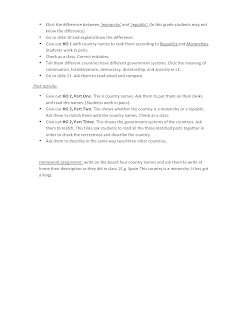Every story has two sides. How do we teach our students to get all the information and facts from different viewpoints before making a decision?
Pre-Video (predicting)
What do you know about the story of the 3 little pigs and Wolf?
What do you think the Wolf will say really happened?
Do you think the Wolf might have some additional information?
During Video (gathering evidence)
What do you know about the story of the 3 little pigs and Wolf?
What do you think the Wolf will say really happened?
Do you think the Wolf might have some additional information?
During Video (gathering evidence)
What was each house made of?
What did the Wolf do at each house?
What was the result of his actions at each house?
After Video (analyzing the evidence) - "Trial of the Wolf"
What did the Wolf do at each house?
What was the result of his actions at each house?
After Video (analyzing the evidence) - "Trial of the Wolf"
(Tea Bardavelidze, Kutaisi School #17 Lesson Task)
Wolf's Counsel: This group will defend the Wolf’s side of the story. They will present the most important reasons why his side of the story should be believed as the truth. They will work together to write a list of reasons and organize the list with details. Each student must contribute at least one reason to build the argument.
Pigs' Counsel: This group will defend the Pigs’ side of the story. They will present the most important reasons why their side of the story should be believed as the truth. They will work together to write a list of reasons and organize the list with details. Each student must contribute at least one reason to build the argument.
Jury: This group will decide the facts. They are as a "jury" and they will decide what is the truth.
Jury: This group will decide the facts. They are as a "jury" and they will decide what is the truth.
Presentations:
The Wolf's counsel and the Pigs' counsel will present their argument by choosing a leader to explain why their side has the most credible and believable argument. While listening, the other group should take notes about points that they think are not credible or believable. After each side has finished their presentations, each side will have the opportunity to review the points that they think are not credible that the other side made and make a final response about those points. The jury must listen carefully and make a decision that is based on the evidence they have heard and the arguments presented.













